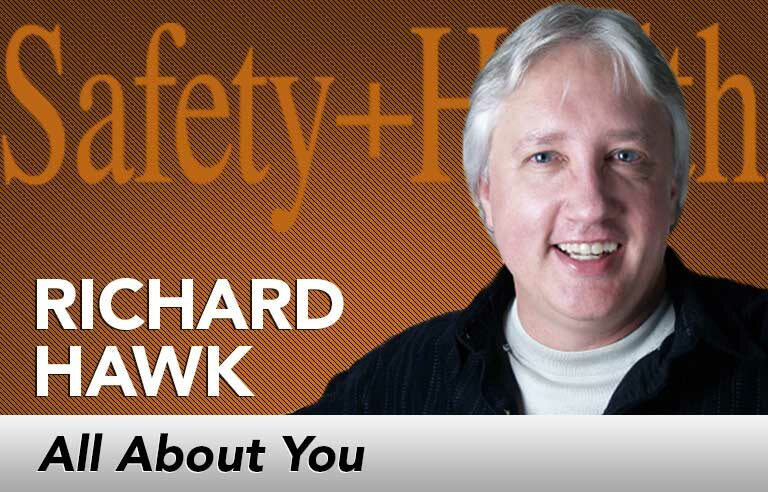All About You: Be open to advice

EDITOR’S NOTE: Motivating employees to work safely is part of the safety professional’s job. But who motivates the motivator? In this monthly column, veteran safety pro and professional speaker Richard Hawk offers his entertaining brand of wisdom to inspire safety pros to perform at their best.
When we hear, “Let me give you some advice,” we tend to react with what psychologists call “egocentric advice discounting.” It’s a mode of thinking in which we know we won’t like what we’re going to hear next – and will ignore it.
Unsolicited advice is like swallowing a sour pill: It may be good for you, but it’s an unpleasant experience.
Why? One reason might be that we didn’t ask for it. Another may be because we usually believe we don’t need it. Our instincts tell us we know the best way to do what we’re doing, whatever that is.
I used to be horrible at taking advice. I’m not saying I’m great at it now, but I’ve learned to appreciate and objectively evaluate advice – whether or not I asked for it. Getting better at accepting advice is important because you can’t objectively evaluate your own behavior. Yes, you may recognize a personal weakness or a chink in your performance, but you still see it subjectively because it’s about you.
Even after I’ve given what I thought was a premier performance at one of my talks, my manager will watch a recording of it and then offer advice. Sometimes it’s about changing something I considered a highlight of the talk. Although it can be painful to hear, usually she’s right.
If you want to get better at reacting to advice, here are a few tips:
Listen before you judge. As soon as we realize someone is giving us advice, we tend to evaluate what they’re telling us rather than simply absorbing what they’re saying. It’s not easy to listen objectively to critical advice, especially if it’s something that elicits strong feelings. If you created a safety process you’re proud of and someone tells you it needs improvement, you’ll tend to become defensive and think of a comeback to prove the person is wrong. And maybe he or she is. But what if the recommended changes improve your program?
My wife is my best, and toughest, critic. I used to interrupt her soon after she would start to critique my talks to justify myself. Now, I try to let her finish her assessment and then ruminate over her advice for a bit before I respond. Objective listening is always helpful, regardless of whether you act on the advice.
Don’t take it personally. Sometimes advice can feel like an insult. “You’re never out in the field, so you don’t care about our safety. You should get out into the plant more.” That’s a comment employees frequently direct at safety and health professionals. I know this from my consulting work with companies that have troubled safety cultures.
Maybe you should go out “in the field” more, but the part about you not caring probably isn’t true. Also, it’s likely the person is frustrated and doesn’t truly believe you don’t care about his or her safety. So although the criticism seems personal, you have control over how much you let it bother you.
Ask other people. During my “Spice It Up!” seminar, I coach attendees about their platform skills. Although my observations usually are accurate, I still recommend that they confer with their co-workers regarding my counsel. I tell them it’s best to ask somebody they trust and know well to give them a second opinion. When one person tells us we need to make a change, it doesn’t carry as much weight as when several people speak up. For example, if somebody says you need to get out in the plant more, it may be true, but it doesn’t have near as much credence as when multiple people express the same sentiment.
Professional golfers hire coaches to improve their skills even though the golfer is better at the sport than the coach. But the golfer realizes that an objective view from someone who is trying to help him or her get better is necessary to improve. The same holds true for the skills we need to perform at our best as safety and health professionals. We need to – and should – welcome advice.
This article represents the views of the author and should not be construed as a National Safety Council endorsement.
Richard Hawk helps companies around the world create more vibrant safety cultures by showing them how to make safety fun. As a professional speaker, author and musician, he also inspires employees to focus better and enlightens safety leaders about ways to increase their influence. To learn more about Richard, visit makesafetyfun.com.
Direct to your inbox: Sign up to be notified in email about new "All About You" columns.
Listen on Soundcloud or Stitcher
Post a comment to this article
Safety+Health welcomes comments that promote respectful dialogue. Please stay on topic. Comments that contain personal attacks, profanity or abusive language – or those aggressively promoting products or services – will be removed. We reserve the right to determine which comments violate our comment policy. (Anonymous comments are welcome; merely skip the “name” field in the comment box. An email address is required but will not be included with your comment.)

